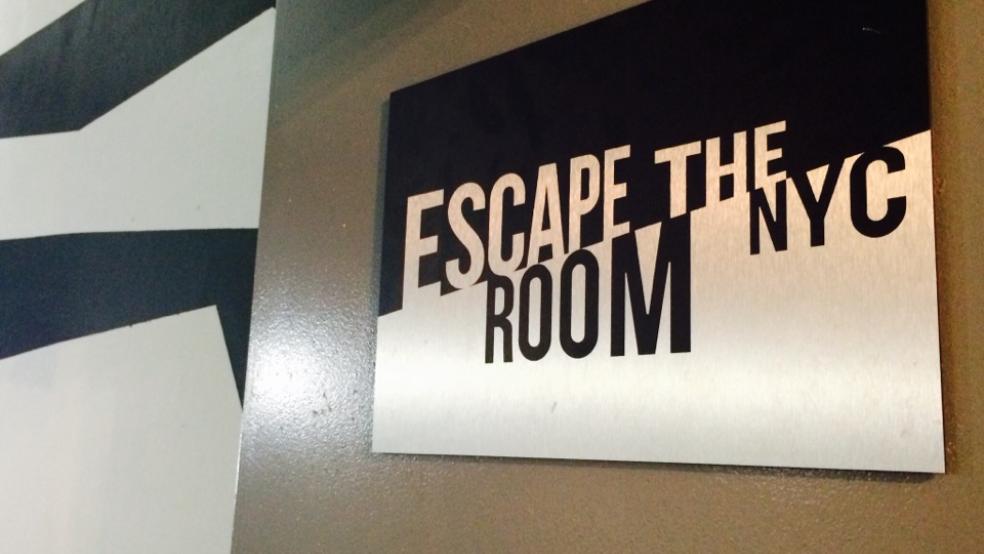Video games have long taken inspiration from other cultural phenomena, but now, thanks to several entrepreneurs, one is becoming a real-world trend.
In a genre of play called "Real Escape Room," two or more people get locked in a decorated room and must solve puzzles to escape—before time runs out.
Few are smart enough, and the success rate averages less than 20 percent, the business owners said.
But the fun lies in the joint puzzle-solving, which spurs tourists and companies alike to pay just under $30 a person to play.
The venues are relatively easy to set up: Create about six themed puzzles, find a room or two to rent and decorate, and advertise on social media.
Thirty-two-year-old Victor Blake is behind the venue in New York City, where his "Escape the Room NYC" is fourth highest on TripAdvisor's local list, just a few months since he opened shop last November.
"It's a new industry. Nobody knows about this," he said of the few similar businesses that have opened in the city and around the country. "At this point we're as a whole educating the market."
Japanese gaming roots
Online escape games, also known as "takagism," have been popular for many years, with mobile versions such as "The Room" topping app downloads today.
In 2007, Takao Kato opened the earliest known real escape room in Japan. After the idea spread to China, Taiwan and other parts of Asia, Kato's friend Kazuya Iwata, 40, brought the game to the United States in 2012.
Located in San Francisco, California, Iwata's "Real Escape Game" had more than 6,000 visitors in its first year. Now, anyone wanting to play must book more than a month in advance, Iwata said.
Related: Mobile Gaming Will Be a $29 Billion Market by 2016
He said companies such as Google, Twitter and Facebook have all organized trips to his escape room. (None of those firms responded to emails for comment.) Through SCRAP, Iwata has organized large escape-the-room-like games in stadiums, and he is organizing a 1,000-person puzzle event in July.
More recently, "LiveGame Escape" opened in mid-May in Las Vegas. Elvin Lau, 23, started the three-room venue with his two Hong Kong friends after seeing the game in Asia. He immigrated from Hong Kong to Las Vegas in eighth grade, studied business management at the University of Nevada-Las Vegas and previously worked in retail, including a stint at Wal-mart.
Although a similar real escape room recently opened up in another part of the city, Lau isn't worried. Instead, he plans to add a fourth room and is in talks with tourists about starting escape the rooms in their home cities.
"If we are successful enough here I think Vegas is a big enough place to support two," he said.
On an unofficial count, Lau said he has had more than 300 visitors since the grand opening on May 15.
Blake wouldn't release numbers on visitors to his New York City rooms, but he has expanded from the original Midtown location to one in the Lower East Side. In the next few months, he hopes to start new ones in at least three other cities around the United States.
As a math major in college, Blake said he always enjoyed solving puzzles, including the video games that "Real Escape Room" is based on. He worked at a Manhattan financial firm for eight years, doing quantitative work in interest rate derivatives for portfolio management.
Related: E3 2014: The Biggest Trends and Best Releases
"There's a real appetite for events where people can be part of what you're doing," he said. Making games is "the best part of the job."
Leah Munson, office manager at The Bosco, a start-up firm, went with eight other co-workers to "Escape the Room NYC" in early June. They were one of the only two teams that got out that day.
"We had a lot of fun. It was a great team-building exercise," she said. "We did wish the narrative was [more] consistent and richer because we're storytellers."
Each venue works to make each room a distinct experience, as themes range from a time travel lab to a corporate office, like the one Munson's team did.
Picking up on a trend
In a world dominated by smartphone games and virtual reality consoles, it's easy to forget that real-world games are not new. As Matt Parker, assistant professor at the NYU Game Center, pointed out, museums and discovery centers have long used play as a part of the experience.
Although none of the analysts CNBC spoke with had yet visited a real escape room, some were involved with annual festivals such as "Come out and Play" in New York City and San Francisco also transform virtual play to public spaces for the public to enjoy at no cost.
Related: E3 2014: Sony Looks to Strike Indie Gaming Gold
"It seems to indicate that there's something else out there," said Frank Lantz, director of the NYU Game Center. "Games used to be a form of experience. The thing that got left out of that equation was human bodies and face-to-face interaction. I think we're seeing a return to those qualities."
In the last year, other real escape rooms have popped up in cities such as Houston, Chicago and Seattle, as well as Toronto and Vancouver.
"I think people are always looking forward to new forms of entertainment," said Eric Handler, senior analyst at MKM Partners. "The problem is they don't have longevity. They are often easy to set up. After a while, you've done it a couple of times. That's the challenge—to keep it fresh."
The competition doesn't rattle Blake, as each venue offers a unique play experience and the rooms as a whole face the greater challenge of outdoing other attractions.
"There's already a fierce competition for time and money," Blake said. "We want to be more fun than any other activity."
More From CNBC.com:

